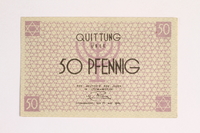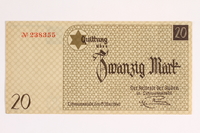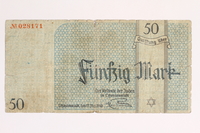Overview
- Date
-
1940 May 15
- Credit Line
- United States Holocaust Memorial Museum Collection, Gift of the Dominican Fathers
Physical Details
- Classification
-
Exchange Media
- Category
-
Money
- Object Type
-
Scrip (aat)
- Physical Description
- rectangular form; brown and cream geometrical background; on recto, brown Star of David at upper left corner, "Zwei Mark" at center, "No 009578" [in orange] near right edge, and "2" at lower right corner; on verso, menorah at center and flanked on each side by "2" encased in circles, "Quittung/Uber" at center above menorah, "Zwei-Mark" superimposed on menorah, and "2" at lower left corner
- Dimensions
- overall: Height: 2.000 inches (5.08 cm) | Width: 4.900 inches (12.446 cm)
- Materials
- overall : paper, ink
Rights & Restrictions
- Conditions on Access
- No restrictions on access
- Conditions on Use
- No restrictions on use
Administrative Notes
- Legal Status
- Permanent Collection
- Provenance
- The scrip was donated to the United States Holocaust Memorial Museum in 2001 by Leo Pelkington.
- Record last modified:
- 2022-07-28 18:23:50
- This page:
- https://collections.ushmm.org/search/catalog/irn14164
Download & Licensing
In-Person Research
- By Appointment
- Request 21 Days in Advance of Visit
- Plan a Research Visit
- Request to See This Object
Contact Us
Also in Leo Pelkington collection
The collection consists of seven pieces of scrip.

Łódź (Litzmannstadt) ghetto scrip, 1 mark note
Object
1 (eine) mark receipt issued in the Łódź ghetto in Poland in May 1940. Nazi Germany occupied Poland on September 1, 1939; Łódź was renamed Litzmannstadt and annexed to the German Reich. In February, the Germans forcibly relocated the large Jewish population into a sealed ghetto. All currency was confiscated in exchange for Quittungen [receipts] that could be exchanged only in the ghetto. The scrip was designed by the Judenrat [Jewish Council] and includes traditional Jewish symbols. The Germans closed the ghetto in the summer of 1944 by deporting the residents to concentration camps or killing centers.








